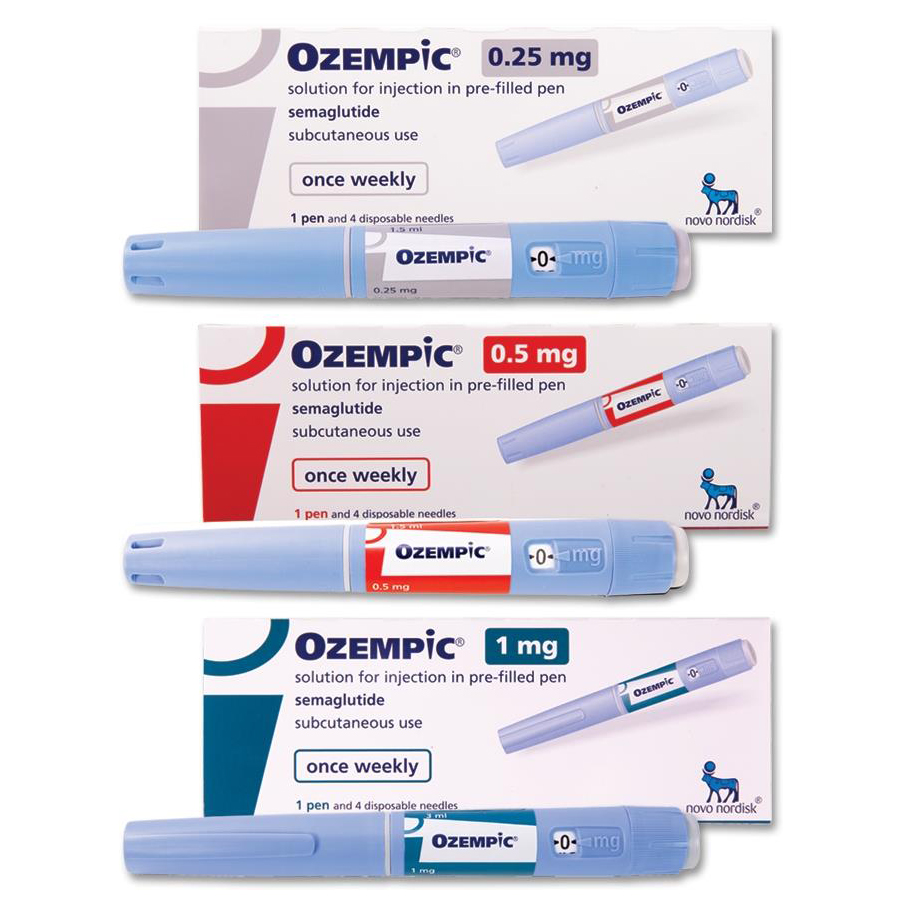
Warning: Risk of Thyroid C-Cell Tumors
In animal studies, Ozempic caused thyroid tumors, including thyroid cancer. It is not known if Ozempic will cause thyroid tumors or a type of thyroid cancer called medullary thyroid carcinoma (MTC) in humans. Notify your provider immediately if you experience a lump or swelling in your neck, hoarseness, difficulty swallowing, or shortness of breath, as these may be symptoms of thyroid cancer.
Ozempic should not be used in individuals with a personal or family history of medullary thyroid carcinoma (MTC) or in patients with Multiple Endocrine Neoplasia syndrome type 2 (MEN 2).
What is the FDA-approved use of Ozempic?
Ozempic is indicated for the treatment of type 2 diabetes, to improve glycemic control, in addition to a reduced-calorie diet and increased physical activity. It may also be used for chronic weight management in adults with obesity or those with overweight conditions combined with a weight-related comorbidity.
Limitations of Use:
Ozempic is not recommended for the treatment of type 1 diabetes or diabetic ketoacidosis.
Who should not use Ozempic?
Do not use Ozempic if:
- You or any of your family have ever had medullary thyroid carcinoma (MTC) or have been diagnosed with Multiple Endocrine Neoplasia syndrome type 2 (MEN 2).
- You have a known allergic reaction to semaglutide or any other component of Ozempic.
- You are pregnant or planning to become pregnant (see Pregnancy and Breastfeeding section).
How should I take Ozempic?
Ozempic is administered once weekly via a subcutaneous injection in the abdomen, thigh, or upper arm. It is available in pre-filled pens. Ozempic can be taken with or without food, at any time of day, but should be administered on the same day each week.
Do not change your dosing regimen or stop taking Ozempic without first discussing it with your healthcare provider. Your provider may adjust your dose depending on your individual response to the medication.
What should I tell my healthcare provider before using Ozempic?
It is important to inform your healthcare provider of all medications you are taking, including prescription drugs, over-the-counter medications, vitamins, and herbal supplements. Some key medications to be aware of include:
- Medications for diabetes: Ozempic is typically used alongside other diabetes treatments, such as metformin or insulin. If you are using insulin or other blood sugar-lowering agents, your healthcare provider may need to adjust your doses to avoid low blood sugar (hypoglycemia).
- Oral medications: Ozempic delays gastric emptying, which could impact the absorption of other oral medications taken simultaneously. Your provider will guide you on how to manage this.
- Other GLP-1 receptor agonists: Ozempic should not be used together with other GLP-1 receptor agonists like liraglutide (Victoza), dulaglutide (Trulicity), or exenatide (Byetta).
Please also inform your provider if you have or have had any of the following:
- Type 1 or type 2 diabetes
- Thyroid cancer or a family history of medullary thyroid carcinoma (MTC)
- Pancreatitis or other gastrointestinal diseases
- Kidney disease
- Retinopathy (eye disease related to diabetes)
- Depression or suicidal thoughts
- Any history of gastrointestinal disorders, such as gastroparesis
Pregnancy and Breastfeeding:
- If you are pregnant: Ozempic should not be used during pregnancy. Animal studies suggest potential harm to the unborn baby. If you become pregnant while taking Ozempic, stop the medication and contact your healthcare provider immediately.
- If you are breastfeeding: It is not known if Ozempic passes into breast milk. You should discuss the potential risks and benefits of using Ozempic while breastfeeding with your healthcare provider.
Pregnancy Registry: A pregnancy registry is available to monitor pregnancy outcomes in women who use Ozempic during pregnancy. Contact the manufacturer for more details.
What are the most serious side effects that I or a caregiver should monitor for when taking Ozempic?
In the event of a medical emergency, seek immediate medical attention.
Serious side effects may include:
- Thyroid C-Cell Tumors: As noted, Ozempic may cause thyroid tumors. Inform your provider if you notice swelling or lumps in your neck, hoarseness, difficulty swallowing, or shortness of breath.
- Acute Pancreatitis: Ozempic has been associated with inflammation of the pancreas (pancreatitis). Monitor for symptoms like severe abdominal pain that doesn’t subside, sometimes radiating to the back, with or without vomiting.
- Severe Gastrointestinal Problems: Ozempic may cause nausea, vomiting, diarrhea, or constipation. In rare cases, these effects may be severe. Consult your provider if these symptoms do not improve or worsen.
- Acute Kidney Injury: Dehydration resulting from gastrointestinal side effects can lead to kidney problems. Ensure adequate fluid intake to avoid dehydration.
- Allergic Reactions: Severe allergic reactions may occur, including swelling of the face, lips, tongue, or throat, hives, or difficulty breathing. If you experience any of these symptoms, stop using Ozempic immediately and seek medical help.
- Hypoglycemia (Low Blood Sugar): When used with other diabetes medications, especially insulin or sulfonylureas, Ozempic may cause low blood sugar. Monitor your blood glucose regularly and be aware of the symptoms of hypoglycemia, such as dizziness, confusion, rapid heartbeat, or sweating.
- Suicidal Thoughts and Behaviors: There may be an increased risk of suicidal thoughts or behaviors. Contact your healthcare provider if you notice any changes in your mood or behavior.
What are the most common side effects of Ozempic?
- Nausea
- Diarrhea
- Vomiting
- Constipation
- Stomach pain
- Indigestion
- Injection site reactions
- Fatigue
- Headache
- Decreased appetite
You are encouraged to report any negative side effects of prescription products to the FDA or the local regulatory authority in your country.
For more information, please refer to the full Prescribing Information for Ozempic.
This information is not comprehensive. Please see the full Prescribing Information for complete safety information.
